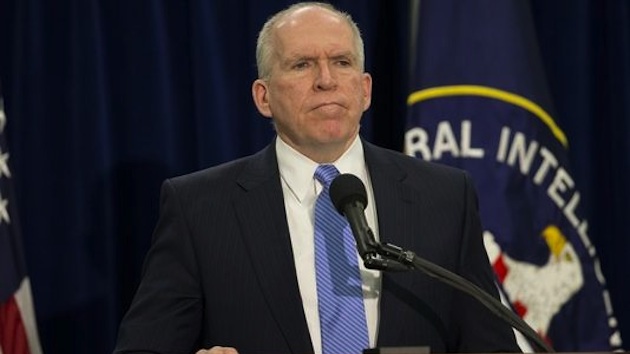

CIA Director John Brennan pauses during a news conference at CIA headquarters in Langley, Va., on Thursday, Dec. 11, 2014.
(Photo: Pablo Martinez Monsivais / AP)
CIA Director John Brennan opened a first-of-its-kind news conference Thursday by recounting the horrors of the 9/11 terrorist attacks, then laid into the Senate report on enhanced interrogation.
“In the aftermath of 9/11, our nation ached, it prayed and it cried,” Brennan said. “Never again we cried, but Al Qaeda had different plans.”
The CIA chief said there were “numerous and credible reports” of second and third waves of attacks, and that “our government and our citizens understood the urgency of the task.”
“This is the backdrop by which the agency was tasked by President Bush to protect the homeland,” Brennan said. “The President authorized the program and it was our job to carry it out.”
While he conceded in rare instances unauthorized methods were used against terrorist detainees, he slammed what he called the “unusual” methods used by Senate Democrats to conduct the report recently released by a Democrat-led Senate panel headed up by Sen. Diane Feinstein (D-CA).
The report was released Tuesday despite dire warnings from lawmakers and intel officials. These warnings, which were even echoed by some within the Obama administration, contended the findings would “endanger the lives of Americans” all over the world.
During the speech, Sen. Diane Feinstein tweeted repeatedly, claiming there was no evidence to suggest the program produced valuable intelligence, despite the testimony from various CIA officials involved in the program. The Senate Democrats’ report, however, did not interview those involved.
EIT authority based on vital, otherwise unavailable intel. Not “useful information.” #ReadTheReport
— Sen Dianne Feinstein (@SenFeinstein) December 11, 2014
At the heart of the clash between the programs’ defenders and supporters is the question of results. While acknowledging their argument, supporters, including the CIA, say it is simply not a factual claim to make.
“However, CIA reviews indicate that the program, including interrogations of detainees on whom EITs were used, did produce valuable and unique intelligence that helped thwart attack plans, capture terrorists and save lives,” an official CIA response said.
Jose Rodriguez, the ex-CIA chief in charge of the enhanced interrogation program, said Senate Democrats released a bogus partisan report aimed to throw the CIA under the bus in order to cover for themselves. He said both Republican and Democratic leadership in the upper and lower Houses of Congress knew, because they were briefed over 30 times over the life of the program.
Critical intelligence that led to bin Laden was unrelated to EITs. #ReadTheReport #TortureReport
— Sen Dianne Feinstein (@SenFeinstein) December 11, 2014
CIA officials have been pushing back hard on the claims made in the report, including that the interrogation didn’t produce the very intelligence that led to Usama bin Laden and that the CIA lied to Congress and the Bush administration regarding the tactics.
Former CIA Directors George J. Tenet, Porter J. Goss and Michael V. Hayden, and former CIA Deputy Directors John E. McLaughlin, Albert M. Calland and Stephen R. Kappes, penned an op-ed in The Wall Street Journal claiming, in fact, the program did work and provided several detailed accounts of actionable intelligence gathering to prove it. One of those accounts included the events and interrogations that led to the location and killing of Usama bin Laden.







